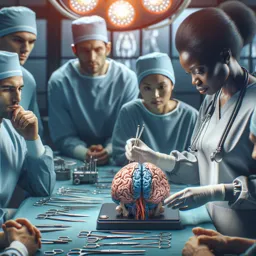Introduction
In the fast-paced world of health and medicine, staying updated with new knowledge and skills is essential for healthcare professionals. Whether you’re a seasoned practitioner or just entering the industry, continuous learningcan enhance career growth and patient care. In this guide, we’ll explore how online courses and lifelong educationcan broaden your expertise and ensure you remain at the forefront of healthcare advancements.
The Role of Online Courses in Continuing Education
With the rise of digital learning, healthcare professionals now have unlimited access to specialized knowledge. Online courses offer: ✅ Flexibility – Study at your own pace, fitting learning into a busy schedule.
✅ Diverse Topics – Covering everything from patient care to healthcare management and medical research methodologies.
✅ Expert-Led Content – Learn from leading professionals in various medical fields.
By enrolling in online health and medicine courses, you gain access to high-quality education without geographical limitations.
Broadening Horizons with Specialized Topics
Health and medicine encompass a wide range of disciplines. Online courses provide targeted learning in areas such as:
- Advanced Patient Care Techniques
- Medical Research and Data Analysis
- Healthcare Management and Leadership
- Public Health and Policy
- Medical Technology and AI in Healthcare
Specialized training helps you develop expertise in niche fields, making you more competitive in your profession.
Building a Proficient Skill Set
Gaining new knowledge is only part of the journey; the ability to apply what you’ve learned is crucial. Many online courses offer: ✅ Hands-on Simulations – Apply medical techniques in real-world scenarios.
✅ Case Studies – Analyze patient cases and develop diagnostic skills.
✅ Practical Assignments – Strengthen your clinical reasoning and problem-solving abilities.
These interactive learning methods help you confidently handle real-world healthcare challenges.
The Benefits of Networking with Peers
One of the most valuable aspects of online learning is the opportunity to connect with healthcare professionals worldwide.
💡 How networking benefits you:
✔ Exchanging ideas with global experts.
✔ Collaborating on projects and research.
✔ Learning from diverse perspectives to enhance patient care.
Through discussion forums, live webinars, and virtual study groups, you can build a strong professional networkthat supports your career growth.
Embracing Lifelong Learning
The healthcare industry evolves constantly, with new technologies, treatments, and policies shaping the way medical professionals operate. Committing to lifelong learning ensures that you: ✅ Stay up to date with medical advancements.
✅ Maintain relevant and effective healthcare skills.
✅ Contribute to improving healthcare systems worldwide.
By continuously expanding your expertise, you become a valuable asset to your organization and a trusted advocate for patient health.
Conclusion
Exploring online courses in health and medicine is a powerful investment in your professional growth. These courses:
- Expand your knowledge
- Refine your clinical skills
- Connect you with like-minded professionals
- Prepare you for future healthcare challenges
Whether you want to gain new competencies or deepen existing ones, online learning provides endless opportunities for advancement.
👉 Take the next step in your medical career today! Explore free courses and continue your journey of professional excellence in healthcare. 🚀



















